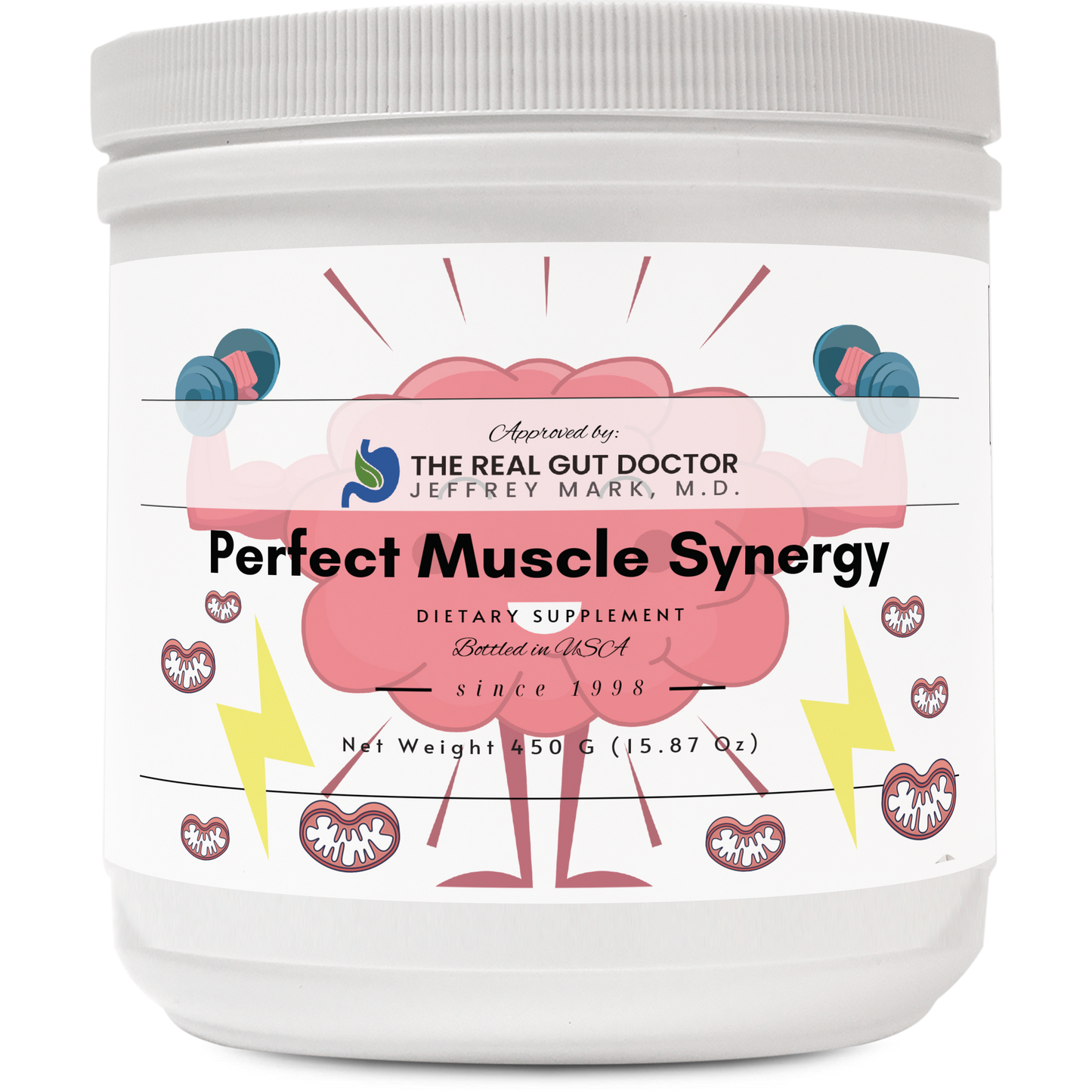The Real Gut Doctor
Perfect Muscle Synergy
Perfect Muscle Synergy
Couldn't load pickup availability
Clinical Applications
• Supports Muscle Performance
• May Support Cognitive Function
• Delivers Creatine, a Vital Component in Cellular Energy
Production
• May Support Lean Muscle Mass in the Aging Population
Perfect Muscle Synergy plays a vital role in the energy production process in muscle cells, making it the perfect supplement to fuel muscle health. Whether you are a trained athlete or simply want to help maintain lean muscle mass during the natural aging process, creatine supports muscle performance when combined with exercise. Creatine may also support cognitive function, helping to keep both brain and brawn at peak performance.
Discussion
Perfect Muscle Synergy features pure creatine monohydrate, an extensively studied supplemental form of creatine. This compound has a well-established vital role in cellular energy production, helping to fuel muscle health in people of all ages
and athletic abilities. Creatine stores phosphate groups as phosphocreatine, which then donates the phosphate groups to adenosine diphosphate (ADP) to regenerate it to adenosine triphosphate (ATP), the primary cellular energy source. Approximately half of the creatine needed by the body is produced endogenously from the amino acid arginine, glycine, and methionine. Creatine can also be obtained through dietary sources, primarily meat and fish. Individuals who consume a predominantly plant-based diet have been suggested to have lower creatine accumulation and a greater response to creatine supplementation. Although 95% of creatine is stored in muscles, it is also found in heart, brain, kidney, retinal, and testicular tissues. Creatine levels can be impacted by diet, physical activity, and a natural decline that occurs with aging. The body metabolizes 1% to 2% of stored creatine daily into the waste product creatinine, which is excreted in the urine. The primary benefit of creatine supplementation is to replenish cellular energy by raising phosphocreatine to accelerate the recycling of ADP to ATP, which is how it helps support muscle performance. However, other tissues that store creatine may also benefit from enhanced cellular energy production. Individual responses to creatine supplementation can vary based on diet, body composition, and intensity of physical activity.
Creatine Supplementation Approaches
Creatine loading refers to a supplementation strategy used to increase creatine stores in skeletal muscle and involves supplementing with an oral dosage of 20 to 25 g/d for 5 to 7 days. Creatine loading doses are typically divided into 4 to 5 servings per day, a practice found to help mitigate gastrointestinal distress associated with doses over 10 g. The loading phase is followed by a daily lower maintenance dose of 3 to 5 g. A 1996 landmark study comparing creatine loading with an everyday maintenance dose found that creatine accumulation in muscle was similar when consumed as a dose of 3g for 28 days or as 20 g for 6 days. Dosage recommendations and whether to load for a short period or take a smaller dose for a longer period may depend on the goal of the individual, but it has been established that both loading- and maintenance-dose strategies can increase creatine stores in skeletal muscle.
Muscle Performance
A substantial body of research has established a role for supplemental creatine in fueling muscles and exercise performance in individuals from across diverse populations and with varying levels of physical activity. Creatine supports muscle performance by boosting ATP production to help muscles contract when anaerobic activity is initiated and helping to maintain a continuous energy supply to the muscle cells when exercising.
Athletes
In a randomized trial in football players (N = 16) designed to assess the long-term effects of creatine on strength and power indices during resistance training, subjects were given 5g of creatine once daily for 10 weeks. The results showed significant increases in muscle performance, strength, and lean body mass, establishing the benefit of low-dose creatine on muscle performance without a loading phase.
Young Adult Men
In a study of healthy men (N = 58) aged 21 ± 2 years who regularly engaged in varying levels of recreational exercise, it was found that 5 g of creatine once daily for 30 days, in combination with resistance training, led to a significant improvement in body mass, mean power, and leg and bench press strength. These results indicate a benefit to muscle performance post creatine supplementation.
Older Women
In a study assessing the effect of creatine combined with resistance training on strength, performance, and body composition in older women (N = 18), subjects were given 5 g of creatine or placebo once daily for 12 weeks. Results indicated an improvement in muscle performance and lean muscle mass in older women when creatine was combined with
resistance training.
Older Adults
In a pilot study in healthy male and female adults (N = 26) over age 60, researchers sought to establish the effect of strength training when combined with 5 g/d of creatine for 16 weeks. Using a hand dynamometer to measure strength and a questionnaire designed to assess cognitive performance, it was determined that creatine supplementation results in
improvements in both strength and cognitive function.
Cognitive Function
The functional role of creatine in cellular energy metabolism, combined with its well-established role in muscle performance, has led to additional studies evaluating its potential to boost brain performance. In a placebo-controlled trial in young vegetarian adults (N = 45), the effect of creatine on intelligence test scores and working memory performance was assessed. Subjects were given 5 g/d of creatine for 6 weeks, which significantly affected working memory and intelligence tasks. These results suggested a beneficial effect of creatine on mental performance. In a larger study (N = 148) that replicated the same design and treatment but included a larger range of cognitive function assessments, creatine was found to have a small beneficial effect. Although the authors did not come to strong conclusions, they suggested that the role of creatine on cognitive performance should be further investigated, given that a small effect could have larger benefits when scaled over time to a larger population group. In a double-blind, placebo-controlled trial, the effect of short-term creatine supplementation on cognitive performance was assessed in healthy young adults (N = 24). It was found that cognitive decline associated with mental fatigue, as measured by a standardized calculation test, was reduced with creatine supplementation of 8 g/d for 5 days. Studies have suggested that creatine supplementation may promote cognitive function in the aging population. A meta analysis of data from 8 randomized trials in older adults aged 66 to 76 found that creatine supplementation enhanced measures of memory performance regardless of dose, duration of intervention, sex, or geographical location. Another meta-analysis of 16 randomized trials with subjects ranging in age from 20 to 76 indicated that creatine may confer beneficial cognitive effects, particularly in the domains of memory, attention time, and processing speed. However, the authors suggested further research to elucidate dose, intervention duration, and precise mechanisms of action. Overall, a link between creatine and cognitive function has been noted in the research; however, additional and more robust trials are needed to further validate the impact of creatine supplementation on enhanced cognitive function.
Lean Muscle Mass
In addition to muscle performance and cognitive function, studies have also explored a role for supplemental creatine in promoting lean muscle mass. In the aging population, creatine has been demonstrated to improve the quality of life by increasing muscle strength and resistance to fatigue. It has also been demonstrated to increase lean body mass in both younger and older adults when combined with resistance training. In a 12-week, parallel-group, double-blind trial, subjects (N = 32) aged 60 to 80 were given 5 g/d of creatine or placebo after resistance training sessions. Participants were assessed for lean mass and strength using dual-energy X-ray absorptiometry (DXA) and 10-repetition maximal tests. Results indicated a significant gain in lean muscle mass when creatine supplementation was combined with resistance training. In a meta-analysis of 19 studies in adults over age 50 (N = 609), the combined effect of creatine supplementation and resistance training was compared with resistance training alone. Results suggested that creatine combined with resistance training has the potential to contribute to a greater reduction in body fat percentage. A meta-analysis of data from randomized clinical trials in generally healthy young, middle-aged, and older adults suggested that 5 to 20 g of creatine daily for up to 48 weeks, combined with resistance exercise, increased lean body mass regardless of age. Neither statistical nor clinical significance in lean body mass was documented for creatine supplementation without exercise. This formulation is designed to provide a daily maintenance dose of creatine to fuel and replenish cellular energy production in tissues where creatine is stored. Widely used by both athletes and individuals concerned about age-related lean muscle loss, creatine supports muscle performance and may also support cognitive function.


Pharmaceutical - Grade Nutraceuticals
Simple. Convenient. Effective.

